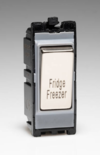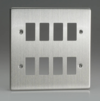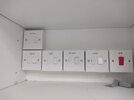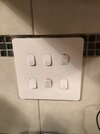I would have gone for a grid system, a double socket faceplate is 4 modular wide, and a fuse holder and a switch is one modular wide, so likely it could be made more compact.
Appliances can be isolated by pulling their plugs.
This is only true if the appliance uses a plug, which can be accessed, and plug and socket is not permitted as an emergency disconnection device, it can be used to isolate of course, so where there is a need for emergency disconnection for example a washing machine if the weights become loose, which means turning off without touching the washing machine, you need a switch easy accessible to isolate the socket common found behind the washing machine so non accessible.
Clearly these switches should not be where you need to empty a cupboard to reach it.
Also found the hard way, not all freezers can be on the freezer switched off to defrost, and again the socket often obscured by the appliance, so some remote method of switching off seems good.
I think technically unless fitted with wheels, over 18 kg is not classed as portable. Which has caused some problems with the new landlord EICR law, as unless fitted with wheels, an appliance over 18 kg is considered as not normally moved, so is included in the inspection, even when the government guide says its not.
So normally switches like this

are used, on a plate like this

above the counter top where there is easy assess.
As a foot note, today washing machines have an auto switch off system for out of balance load, so the need for a switch easy accessed to switch off the machine in the case of an emergency is not as important as it once was. The regulations say "Where in case of danger there is the necessity for immediate interruption of supply, an interrupting device shall be installed in such a way that it can be easily recognised and effectively and rapidly operated."
The FCU is one way, however rather pointless inside a cupboard like that.





